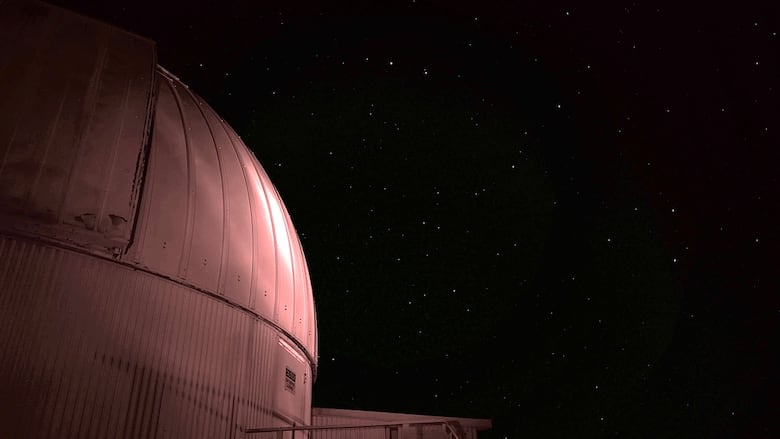Canada needs agency to manage public UFO sightings, says new federal report
Federal mechanisms for UFO reporting 'fragmented,' says report commissioned by office of chief science adviser

Canada needs a transparent, public-facing agency in charge of managing reports of mystifying things seen darting, blinking or hovering through our skies, according to a new report commissioned by Canada's top scientist.
The Sky Canada Project report published this week calls for a federal framework for managing UFO sightings by the public and pilots as a replacement for the current patchwork of protocols across departments that "hinder[s] scientific investigation."
"There is some evidence that there's something really unusual going on in the skies.… We just don't have enough information," said Winnipeg-based science writer Chris Rutkowski, director of the long-running Canadian UFO Survey, who was consulted for the report.
The Sky Canada Project was created in 2022 by the office of Mona Nemer, Canada's chief science adviser, partly in response to growing public interest in the topic of UFOs — also known as UAP, or unidentified anomalous or aerial phenomena.
Staff set out to identify challenges related to data collection on UAP sightings and provide a summary of how other countries approach the issue.
The project was tasked with doing an environmental scan of historical reporting practices across the federal government and present-day UAP procedures of different federal agencies, and to consult non-governmental groups and experts in the country tracking and receiving UAP reports from the public.

The report found Canada's "fragmented" UAP reporting protocols across departments "complicates the application of scientific principles ... making it onerous, if not impossible, for researchers to access and compile data for rigorous, science-based analysis."
"Canada would benefit from an improved process for reporting, collecting, and studying UAP sightings," reads a section of the report.
Canada once had a centralized office for that run by the National Research Council beginning in 1967, with help from the RCMP.
That's the same year one of Canada's best-documented UFO cases emerged in Falcon Lake, Man.
The NRC effort ended in 1995. Roles and responsibilities were scattered among the Canadian Space Agency, Transport Canada, NavCanada — and Rutkowski, who amassed vast civilian, military, police and air traffic controller records of UAP reports dating back to the 1940s that Sky Canada has used in its analysis.
No definitive proof of ET
In recent years, NASA has conducted an independent UAP study; the U.S. Office of the Secretary of Defence erected the All-Domain Anomaly Resolution Office (AARO) to investigate UAP reports by military personnel; and Congress has held multiple public hearings centring on national security concerns posed by UAP and alleged government coverups.

Most UAP sightings happen to be planes, atmospheric conditions, planets or stars or meteors, satellites, weather balloons, drones, experimental craft, optical illusions or other mundane phenomena.
To date, there's still no evidence definitively proving extraterrestrial life is here or exists, notes the Sky Canada report.
"Nonetheless, some UAP sightings — for which data exist — remain unexplained even after investigation," the report says.
That uncertainty adds to the cultural fascination around UAPs.
"There is some interesting stuff being reported," said Rutkowski. "It doesn't necessarily prove that aliens are visiting us. It proves that some unusual cases are baffling."
Dispelling disinformation
The report also identifies the need to increase transparency and build public trust through proactive disclosure of UAP case details in an effort to combat misinformation and disinformation, and "pre-bunk" conspiracy theories before they spread.

"Everyone loves the idea of searching for UFOs or UAPs," said Sara Seager, a Canadian-American astrophysicist at MIT focused on the search for Earth-like planets.
"Taking that into a way to educate people about misinformation, about challenging your own assumptions ... I had never thought of the field in those terms before, and that was a really, really exciting new thing to me."
The report suggests the Canadian Space Agency might be a good fit to lead public UAP data management.
Seager thinks a post-secondary institution might be more appropriate.
"Universities are used to educating people, so perhaps there's a way they can, as the report said, parse this into some kind of outreach about planets and stars and natural phenomena," said Seager, who wasn't involved in the report.
Report cites Harvard UAP team
Sky Canada never set out to prove whether we're alone in the universe, the report says, nor was that project in particular to analyze data of sightings.

Astrophysicist Avi Loeb is hunting for evidence of alien technology within Earth's atmosphere and our solar system through a data-driven approach.
Loeb wasn't involved in the report either. However, his work as head of Harvard's Galileo Project was cited by Sky Canada Project as an initiative that could prove "crucial in transitioning from anecdotal evidence to more scientifically rigorous analysis" of UAP.
That project will have three uniquely constructed observatories in different U.S. states upon completion that use sensors and machine learning to spot and measure speed, size, relative distance and other variables of UAP flitting around American airspace — including balloons or craft from rival governments engaging in espionage.
"The software we develop, the sensors we put together can be used by the Department of Defence if these are human-made objects, so I wouldn't feel like I wasted my time if we end up finding only human-made objects," said Loeb.
"This subject, of course, touches upon national security for Canada and the U.S., and I think co-operation would be very much appreciated."
Rutkowski appreciates Sky Canada's calls to encourage pilots to report sightings, and for more science on a topic still at times dogged by stigma and a "ridicule factor."
"Things are looking up and, you know, there's no question that the truth is out there," he said. "Unfortunately, we're stuck down here."


